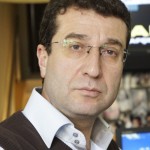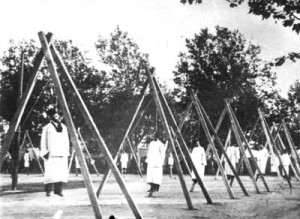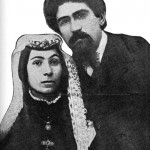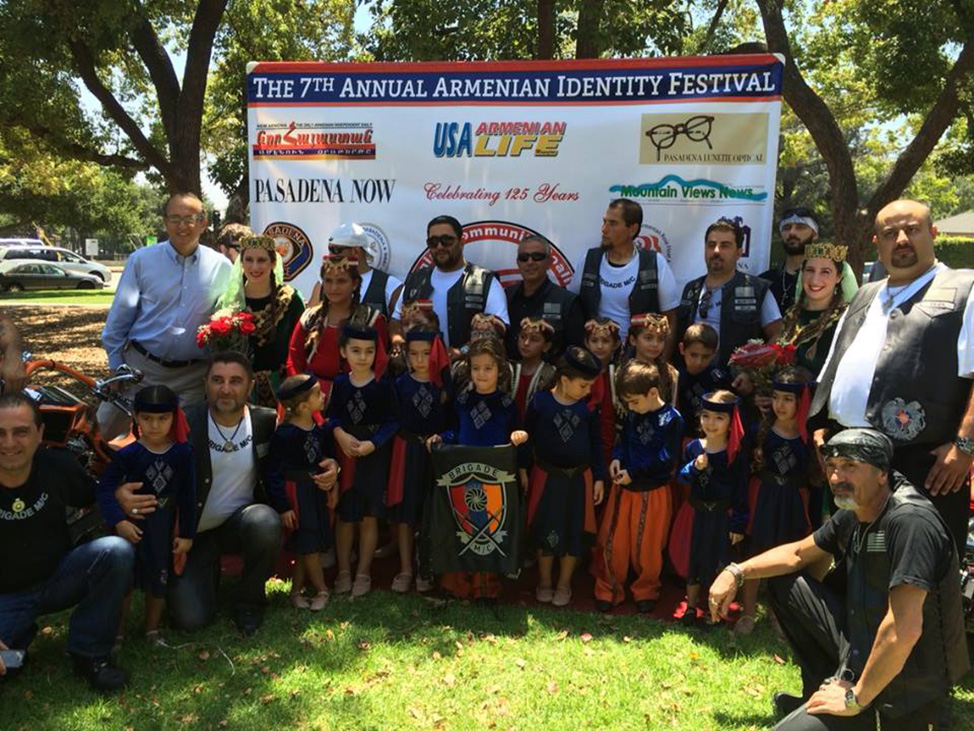 By Kadir Akin
By Kadir Akin
The tragic story of the Armenian Socialist Paramaz, also known as Matteos Sarkissian, and his 19 comrades, who were hanged on 15/16 June 1915 in Beyazit district of Istanbul, remains very alive in the collective memory of the Armenian society today. Conversely, the case of the 20s remains unknown to many in Turkey, including the political circles, despite the fact that the country began slowly to confront its past.
In these coming days of the centennial of 1915, the number of discussions of “the many ways and means to face the past†are increasing. In such a context, bringing up the case of the hangings of the 20s is indispensable if we want to face the ghosts wandering in Turkey’s past by positioning ourselves against the act of forgetting and by demanding that justice be served, even when late.
Flare of “Medz Yeghernâ€/Great Atrocities: the hangings of Paramaz and his comrades on June 15th, 1915
It was almost like the flare of “medz yeghernâ€/Great Atrocities when only three weeks after the mass arrests of April 24, which marked the beginning of the state’s sending close to one million Armenians into forced migration, Paramaz and his Social Democratic Hunchakian Party member comrades based at Beyazit were sent to death following their unlawful trial.
Without finding the time to mourn the deaths of Paramaz and his comrades, the Armenian people were rolled into an even greater pain. The leadership of Progress and Union Party, which dominated the political life of the Ottoman Empire at the turn of the last century, had kept forced assimilation and Turkification as state policies in the country’s political agenda. The leadership had seized the opportunity to implement these policies in the aftermath of the Balkan Wars when Balkan nations rose up against the Ottoman yoke in order to determine their own destinies and when the Empire lost significant land as a result of the wars. Moreover, the Ottoman army’s defeat at Sarikamis, Kars on January 10, 1915 and the Empire’s losing of its hegemony in the Middle East as a result of this defeat served as an alibi for the Progress and Union Party to quickly implement its assimilation policies. Beginning with Armenians, the Greeks and autochthonous nations of the Anatolian peninsula such as Assyrians and the Chaldeans were torn off of their lands for centuries and were forced into exile. They have been sent off to desert areas such as the Deir-ez-Zo to march to their deaths and were subjected to a genocide as a result of a calculated ethnic engineering.1 The story of Paramaz and his comrades, who were sent to death following an unlawful trial, sums up the foregoing lawlessness without justice that brought about forced migrations and deportations.
Towards the end of June of 1914, the founders, executives and Istanbul members of the Socialist Democratic Hunchakian Party (SDHP) were arrested and put into custody after someone informed against them alleging that the party took a decision to organize the assassination of Progress and Union forerunner Talat Pasha, during its 7th party congress which took place in the Romanian town of Constanta on September 17, 1913. Paramaz was among them.2
Cases of those who were arrested were not yet heard, and without definite knowledge of when that might be, they were kept shackled under horrific conditions in the basement of Istanbul central prison house for months, while their interrogators tortured them. Indeed, one of the decisions taken at the 7th party congress of the Socialist Democrat Hunchakian Party was about to leave the decision of organizing such a plot to the central committee.
The 7th congress did not attract significant number of delegate, which had caused some problems at the time with regards to decision-making during the meeting. The 6th party congress that met in Istanbul in 1909 had ended with the firm decision of legalization of the party. Yet, members at the Constanta congress decided to go back to their underground work. In fact, the decision to become legal/officially legitimate drove serious rifts of opinion within the party during the 6th congress. The group that included Stepan Sapah-Gulian and Paramaz had objected to legalization. Nevertheless their objections did not cause major divisions within the party and all have conceded to this decision.3 Surely, the new constitution that was declared in 1908 with the Second Constitutional Monarchy has granted Armenians the right to self-representation in the Ottoman Parliament, much like other nations, who have legalized their organizations. The Hunchaks had much cooperated with socialists and liberals against the Progress and Union members.4
Paramaz’s involvement in the assassination of the Tsar’s governor of Caucasia in 1905 was well known among the party members, but even though he was not able to attend the Constanta party congress, he was elected to the central committee.
Arsavir Sahakyan, who attended the party congress as the Egyptian delegate, and was suspected of playing a role in the police operation against the SDHP by cooperating with the Ottoman police had further exacerbated the arrests of SDHP members by informing the police that he was nearly assassinated on January 28, 1914 around Tarlabasi district of Beyoglu.5 Up to 120 SDHP members were arrested and were tortured for many moths to come. Some were released after the intervention of many intermediaries and the payment of many bribes. The number of remaining arrestees decreased to 49. When the trial began, however, the number of those on the bench was 23 including 2 absentia. One of those tried, Hemayak Aramyan gave a statement incriminating Paramaz and his friends.
The events in Van were used as an excuse for the arrests of 240 Armenian intellectuals and community leaders on April 24-25, 1915 in Istanbul, who then were sent to exile. The number of such exiles went beyond two thousand by the end of May. With the Deportation Law of May 27, thousands of Armenians were sent on the road to genocide. Coincidently, the military tribunal (divan-i harp) took up the case of Social Democrat Huchhakian Party central committee member Paramaz (Madteos Sarkisyan) and his comrades. Nobody at the time could have foreseen that the trial of an unfinished assassination attempt would lead to the executions of Paramaz and his comrades.
Beginning on May 10, 1915, the trial lasted for 17 days and ended on May 27, which is also the date when the Deportation Law was issued. Paramaz and 21 other Hunchakian Party members were tried for: “engaging in armed action in order to form a free and independent Armenia; conspiring against the state’s indivisible unity by means of provoking foreign governments against the Ottoman Empire; holding open and secret meetings in different places in order to incite some Ottoman peoples to break away from Ottoman dominion and form their own states; to those ends, use propaganda means such as print media and organize provocative actions.†Paramaz’s dialogue with the chairman of the tribunal still carries significance because his defense is still valid and it proves the extent of the injustices to which these men were subjected. In response to the question of the chairman as to whether he engaged in armed insurrection and secessionism against the Empire, Paramaz responded: “what is left that we have not done for the welfare of this country? We accepted such self-sacrificing conditions in order to institute the brotherhood between Turks and Armenians. How much energy we expended; how much blood we shed! The reason why we endured so much pain was to elevate each other based on mutual confidence. And what do we get in return? You not only denied our extraordinary efforts [to live together in peace] but you tried to annihilate us. You have attempted to tear us apart form our land by occupying it for 600 years. And now you are attempting to transform Ottoman lands into a Turkey. When you do these, you do not consider yourself to be guilty of anything; but us when we attempt to do the same based on our historical right?!â€
Paramaz and his comrades were first arrested in 1898 in Van and were sentenced to death. He was a Russian citizen and was extradited to Russia by the request of this country. When he was tried at court in Van, he was reported to defend himself with the following statement: “We want equality [of all nations]. We do not follow rigid nationalism. Our demand is that Armenians, Turks, Kurds, Alevis, Lazis, Yezidis, Assyrians, Arabs and Coptics live together under same conditions. As a revolutionary, I believe we can attain this objective. But the Ottoman state policies direct at Turkism. You go back to the same point, Turkism, where you came from hundred years ago.6
20 men including Paramaz were sentenced to death 17 years later. Stepan Sapah-Gulian and Hagop Tivrapian were sentenced in their absentia. Sultan Mehmet Resat approved the court’s decision on June 5 and ordered the Minister of War Enver Pasha to conduct the executions.7
 20 hunchakian gallows
20 hunchakian gallows
In the morning of June 15, 1915 before dusk, the 20s were brought next to the gallows to be executed. Their death sentences were read to them. Paramaz turned to his friends and said: “Comrades, we will march to death with our heads up, like bravemen.†Dr. Benne, who was one of the 20, shouted to the faces of his executioners: “You are hanging us, the 20, but 20 thousand will follow after.†The hangmen brought first Paramaz to the gallows. Before they kicked the stool out from under his feet, Paramaz shouted: “You can destroy our bodies, but never our ideas…Tomorrow Armenians will salute a free and socialist Armenia in the East of the country. Long live socialism!†While others followed him into the gallows and in his last wishes, the worker Yervant sang a song as he waited for the knot to find his neck: “Death is the same everywhere, but how happy for the martyr who dies for the liberation of his people.â€
Priest Kalust Boghosyan who was observing the hangings wrote about that day as follows: “After the hangings of the 20 revolutionary Armenians, sergeants hung death sentences nailed on wooden pallets around the victims’ neck. They called the photographers and had many pictures taken of them with the dead bodies. A doctor certified that each and every one of them was truly dead and wrote reports. The bodies of the 20s were then taken off of the gallows and carried away to the Edirnekapi Armenian cemetery on horse wagon.†On the horse wagon, their bodies were put one on the other. They were not buried at the cemetery individually, but en masse, in accordance with Aram Achikbashyan’s will.8
Paramaz in Memories
The Armenian people have never forgotten this event. Both in the memories of those who remained in this land and of those who were dispersed into four corners of the world as a result of deportations, what happened to Paramaz and his comrades, and their defenses at the trial and heroism were carried from one generation of Armenians to another. Armenians who survived deportations and remained in Turkey remember and speak of this event quietly. Those living in Armenia and in the diaspora commemorate this event in open, pronounced ways. Paramaz took his rightful place as a folk hero in the collective memory of the Armenian people.
In Turkey, the tragic events surrounding killings of Paramaz and his comrades do appear only in a few books and articles. In 1921 the Dashnaks, Hunchaks and Ramgavars in Istanbul organized a joint commemoration but nothing came after for ninety years. A panel and a commemorative event organized in June 2013 where the hangings took place at the Beyazit Square in Istanbul brought this tragic incident, about which there has been hitherto limited amount of publicity, to public attention among the leftists in Turkey. Awareness of the story of 20 revolutionary Armenians emerged due to activities that took place within that framework. One would admit of course that the commemoration of what happened to Paramaz and his comrades by means of such public activities almost a hundred years later were belated efforts that nevertheless constitute a first step towards confronting the past.
 Paramaz and his wife
Paramaz and his wife
When we look at the movement in Turkey, Turkish socialists do not keep Paramaz and his comrades alive in their collective political history, even though it is a fact that Armenians and Greeks (and Bulgarians and Jews) who lived in Istanbul at the time were among the pioneers/founding figures of the socialist movement.9 The fact that neither the Communist Party of Turkey (TKP) nor the left-socialist movements remember Paramaz and his comarades is due to the continuing influence of Kemalism, the founding ideology of the Turkish republic and a preceding movement of the Progress and Union, on the Left. Many Kemalist figures committed the crime of deportation and were tried at the court beginning in 1919 in Istanbul and then in Malta, but they were also acquitted by M. Kemal himself and later played an important role in the constitution of the republic.10 Deportations of Armenians and the public perceptions about their deportation have influenced left-socialist movements in Turkey for many years. The influence of Kemalism over left-socialist movements and their lack of internationalism led to the ignorance and forgetting of ‘other’ socialists and their struggles, who inhabited the same land, while knowledge and collective memory from these struggles have never been passed on to new generations.
Confronting the past, knowing our history right
I have mentioned before that while Armenian people’s collective memory retains the tragic story of Paramaz and his 19 comrades, the number of intellectuals, democrats, and socialists of Turkey who remember the cause/case of the 20 is quite small. Even though socialists like Deniz Gezmis, Mahir Çayan, Ibrahim Kaypakkaya, Mazlum Dogan and their comrades who died on the gallows and in the torture chambers have kept alive the legacy of the 20s and Paramaz—albeit unwittingly.
Forced migrations of Armenians have not only resulted in genocide, they have also hurt the roots of blooming socialism in these lands. The socialist movement here would have taken a different course, had the socialists of Turkey and their organizations been familiar with the socialist literature that was produced by those who came before them, had known about their predecessors’ concerns which are all the more significant today while witnessing contemporary developments, and had a full grasp of the struggle that their predecessors waged with Ottoman laborers from all of the Empire’s nationalities. Indeed, some of the ideas in the Hunchaks’ party program from 1910 continue to have relevance today: “For the working class, which constitutes the majority of human beings, to be emancipated, it needs to own land, factories, banks, valuable financial institutions and railways – tools that serve to production, capital exchange and communication. The administrative, financial and economic conditions and taxation system to which Ottoman peoples are subjected today will bring the desctruction of the working class. This people finds itself under such economic circumstances that on one hand capitalist system takes over the production process, while the old relations of production are disappearing, on the other hand, the bourgeois class is vying for power with leftover of the feudal system. To that end, it tries to use social organizations solely for its own class interestsâ€
Main principles listed in the party program were the following:
1. A general Assembly, having full powers, elected by direct and general popular suffrage.
2. Provincial and Communal autonomy.
3. Equality before the law of all citizens, without distinction of nationality, religion or sex.
4. Complete freedom of press, conscience and meetings.
5. The institution of Habeas Corpus as a safeguard of liberty.
6. The separation of church and State.
7. The general arming of the entire manhood into a popular militia, in time of peace.
8. The establishment of a secular and obligatory system of public instruction, etc.
9. The abolition of the existing system of Contributions and the establishment of a progressive system.
10. The total abrogation of indirect contributions.
11. The liberation of peasants from debts of all descriptions.
12. The enactment of special laws for the protection of labor against speculations, etc.
I remind you that these demands were made 114 years ago.
Kegham Vanigian, who was hanged with Paramaz, was the editor of the youth magazine “Gaidz†(Spark). Vanikian published a counter opinion to the thesis on the impossibility of establishing socialism in the Ottoman Empire and argued that the working class made socialism real: “Wherever is electricity and steam power, there is proletariat. And wherever is proletariat, there will be class struggle and socialist struggle.â€12
***
Though belatedly, it is imperative to commemorate Paramaz and his comrades by fully appreciating their camaraderie, to resist forgetting, and to demand that justice be served. On the centennial of the state killings of the 20, we will help constitute contemporary democratic consciousness in Turkey by way of a documentary film about Paramaz and his comrades. We need to devise a way to begin commemorating Paramaz and his comrades not as “others’ socialistsâ€, “heroes of other people†and “other revolutionariesâ€, but as “our ownâ€. We need to make them a part of our history of common struggles. And we need to be able to do these things today as societal opposition with common demands for peace and democracy comes together and crystalizes in the Gezi Resistance, and as the search for solidarity among the socialists materializes. If we can manage to pass the legacy of Comrade Paramaz onto young generations in Turkey, we can then begin to believe in the possibility of leaving them with a future wherein people in this geography were to live side by side under common conditions of peace and comradeship based on equality.
Notes
1 Modern Türkiye’nin Sifresi – Ittihat ve Terakki’nin Etnisite Mühendisligi (1913-1918) Fuat Dündar
2 G. K. Baskanligi “Arsiv Belgeleriyle Ermeni Faaliyetleri†(1914-1918) cilt iv
3 Steban Sabah-Gülyan (asil adi, Stepanos Der-Danielyan) 1887’de Cenevre’de kurulan SDHP önderlerinden. 1908 yilinda Ittihat ve Terakkiyi de elestiren yazilar yazdi. 1991 yilinda yazilari Ermenistan’da kitap olarak basildi. 20’ler davasinda giyabinda ölüme mahkum edildi. 1861 Nahcivan dogumlu 1927’de ABD’de öldü
4 1912 Yilindaki Osmanli’daki Seçimler ve Bati Ermenileri Dr.Yeghig Djeredjian Beyrut -2007
5 Arsavir Sahakyan SDHP’nin Romanya-Köstence’deki 7. kongresine Misir delegesi olarak katildi. Osmanli Emniyetiyle isbirligi yapti. Osmanli Imparatorlugu disinda baska devletlerin istihbarat örgütleriyle de çalistigina iliskin bilgiler var. 1918 yilinda Adana’da Paramaz’in arkadaslarinca öldürüldü
6 Dr. Yeghig Djeredjian arsivi-Beyrut
7 G. K. Baskanligi “Arsiv Belgeleriyle Ermeni Faaliyetleri†(1914-1918) syf.63
8 Sonsuzlugun Yolculari – Hrant Amiryan (ilgili bölümlerin çevirisi: Sarkis Hatspanian)
9 Osmanli Impratorlugu’nda Sosyalizm ve Milliyetçilik (1876-1923) Mete Tuncay-Erik Jan Zürcher
10 Malta Sürgünlerini Nasil Bilirsiniz – Ayse Hür
11 http://www.hunchak.org.au/aboutus/historical_turabian.html. Also see G. K. Baskanligi “Arsiv Belgeleriyle Ermeni Faaliyetleri†(1914-1918) Osmanli Sosyal Demokret Hinçakyan Örgütü Ana Tüzüðü syf. 68
12 Dr. Yeghig Djeredjian arsivi – Beyrut
Comrade Paramaz: A Revolutionary from Turkey






